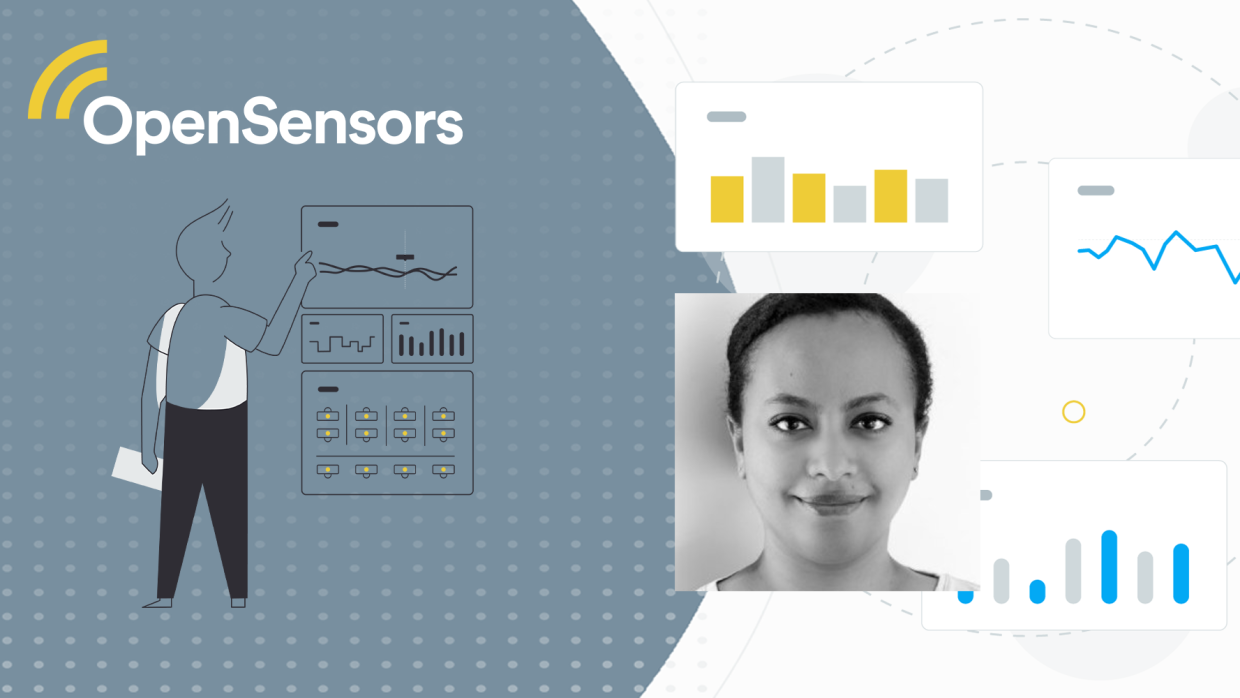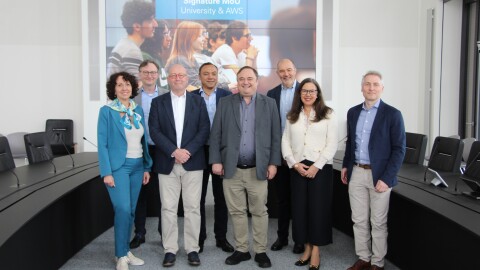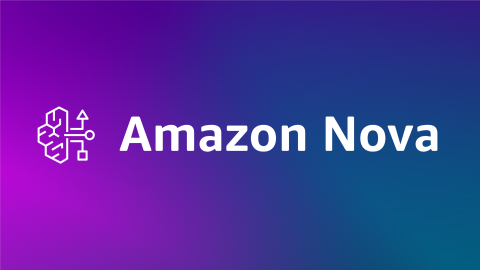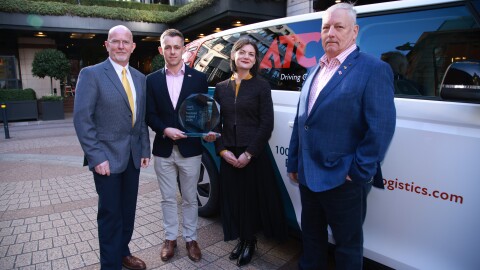In this new blog series, we are shining a spotlight on women founders who have built trailblazing businesses using AWS technologies to power their innovations. From apps that connect women at different life stages or tackle food waste, to inventive technology that monitors air quality, meet the women using technology to drive change in their industries. To kick things off, we spoke to Yodit Stanton of OpenSensors.
Yodit Stanton’s career has revolved around data – looking at data in real-time, drawing out actionable insights, and driving insight-led decision-making. Now Yodit is applying these years of experience to help make commercial real estate and workplaces safer, simpler and more efficient.
Her business OpenSensors leverages AWS-enabled Internet of Things (IoT) technology – physical objects connected with sensors and software to connect and exchange data over the Internet – to make human, social, economic and environmental sustainability a reality for every workplace in the world.
Creating a safe work environment
In light of the COVID-19 pandemic, one immediate benefit of OpenSensors’ technology has been to help facilities teams to monitor indoor air quality levels to ensure a safe return to work.
Before the creation of OpenSensors, Yodit was already looking into air quality data to help her eldest daughter, who has severe asthma. Realizing there was minimal environmental data readily available on indoor air quality and space, the beginning of OpenSensors began to take shape.
Yodit was inspired to develop infrastructure that could provide in-depth monitoring of indoor air quality, and many other factors which contribute to our day-to-day quality of life in the buildings where we live, learn and work. We spoke to Yodit about her inspiration to build OpenSensors, her success to date, plans for the future, and how AWS technology is helping to unlock new layers of data-led insight.
Quality of life where we live, learn and work
“I was a software developer for over twenty years and spent a good part of my career in finance, some of it on the trading floors,” Yodit explains. “My focus was on real-time data analysis, and the key issues were always Internet latency and data volume – this was before the idea of ‘big data’ came along and changed everything.”
“Later on, I began consulting on ‘big data’ by using AWS services to take and analyze data from trading floors to this exciting new technology called the cloud! We were accessing and analyzing vital information at new speeds, with many benefits to a range of business sectors.”
Around the same time, Yodit began thinking about how she could apply the same ideas and processes to monitor air quality in a way that would benefit her daughter’s asthma. She also realized that data-driven insights, IoT and connected devices could improve the environments where we live, learn and work on a global scale: “IoT had been used to do a ton of stuff in marketing, for example, but nobody had thought about physical real estate and workers. Why was that? Real estate is often the second largest cost for a business.”
“We spend 70-80% of our time indoors, so air filtration matters a lot, especially from a productivity perspective,” she adds. “The more people there are in a workspace, the higher the CO2. There’s a huge correlation between CO2, the immune system, and the cognitive performance of employees.”
Yodit saw air quality control monitoring as a practical way to improve indoor safety: “CO2 levels above 600ppm (parts per million is a unit of measurement for air quality standards) not only leave employees feeling lethargic but also at higher risk of catching viruses. Tracking these levels is a logical next step.”
“My early customers and partners were also asking bigger questions about their real estate. They wanted to know how they could tackle the environmental inefficiencies in their workspaces and make them better places to be in.
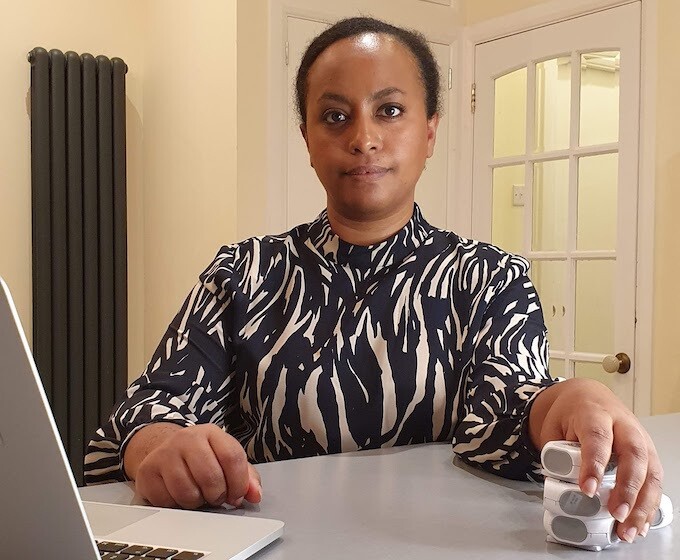
“In the early days of OpenSensors, I spent time with Facilities Managers in the commercial real estate sector learning about their world. It was fascinating,” she explains. This research would shape the offering she took to market.
“I came to realize that we have enough real estate already in big cities like London. We don’t need to build more, we need to use it better! This problem was invisible to the naked eye without data insights, and I knew we could help by delivering tangible data sets that Facilities Managers and their employers could act on.
“OpenSensors is now a product-driven business designed for anybody managing any kind of facility or workspace. We provide an in-depth data dashboard, fitting hundreds of physical, connected sensors to monitor a huge range of data points, and then we deliver clear, actionable information.”
Tech to shape lives for good
Yodit was born in Britain with Ethiopian roots but spent much of her childhood abroad in the US, East Africa and Europe, where her father worked as a commercial sailor. “These experiences informed that desire later in my career to use technology to help people directly. I loved seeing how technology evolved to change the world – and I wanted to make my own positive impact,” she explains.
“For example, I knew that children born and raised near busy roads were likely to have lower lung capacity and problems associated with asthma, like my own daughter. Air quality can be seen as an issue of economic equality, and indirectly this also has a racial aspect. It is another area of ‘unseen’ inequality in economic and health terms.”
By collating data about asthma in children and mapping it against problems with air quality in specific neighborhoods, she could make an impact: “I knew that I could not change city planning or clean the air myself – but I had the tools and expertise to illustrate the problem for everybody to see.
“IoT technology is now one of the most powerful means of gathering and understanding data. This field of study is constantly evolving and will change the way we interact with physical environments – and we’re only now realizing its potential.” She points to digital transformation in agriculture as an example, where data is being used to analyze soil quality and make farming more efficient.
The impact of the pandemic has heightened the importance of IoT-derived data: “When COVID-19 arrived, we realized we had a business at the forefront of a key question about how we can return to normality.”
Yodit and her team invested time in marketing, publishing and research on the indoor environment, and how viruses like COVID-19 can spread.
“We found that humidity levels, for example, play a key role in virus transmission: 40-50% humidity could increase transmission of COVID-19 by 60-70%. Particulate matter is also of critical concern. Above a certain level, even with a small increase in particulate matter, we can measure mortality related to COVID-19.”
Building solutions with AWS
Yodit has worked with AWS products and services throughout her career, so building OpenSensors in the AWS Cloud was a natural choice.
“We know that IoT solutions need to be seamless for our clients. AWS makes it simple to process and securely store millions of data points from sensors, then present the data back to our clients in an understandable way.
“We use AWS Lambda, a serverless compute service that gives us the flexibility to scale our processing, data storage, and infrastructure really fast, with minimal effort. Lambda takes care of administrative tasks such as set up, patching, and backups, freeing up my team to focus on what matters – our clients’ needs.
“AWS helps to simplify our processes and allows us to continue rapidly developing our product rather than worrying too much about maintenance.”
AWS microservices have relieved a considerable burden on Yodit’s workload, too. For example, Elastic Load Balancing automatically distributes incoming traffic across various targets, making significant savings on management overheads.
“We would need to double the size of our product development team if we didn’t have the support of AWS microservices,” she adds.
OpenSensors is already thriving in the US and Europe. Looking to the future, Yodit believes that in-depth data insights will dramatically influence how we design public facilities, office spaces, and ultimately entire cities.
“Our built environments have been developed over time based on the experience of designers, subjective surveys from people within facilities, and architectural or city planning factors such as ‘value engineering’. But we have not necessarily thought about the health, efficiency, or space occupation of these buildings – and we can do more to value the health and day-to-day experiences of people who use those spaces.
“With new conversations and priorities about how we live, learn, work and much more as a result of the pandemic, it’s exciting to think about how technology can build new models that improve our lives over the long-term. At OpenSensors, we want to play a big part in building that future.”


